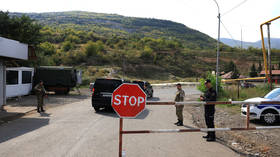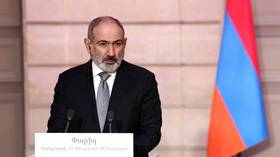NATO won’t bring stability to Caucasus – Kremlin

Russia is well aware of NATO’s attempts to court post-Soviet republics in the South Caucasus, but the bloc’s overtures will bring no benefit to the region, Kremlin spokesman Dmitry Peskov has said.
Speaking to reporters on Tuesday, Peskov commented on NATO Secretary-General Jens Stoltenberg’s tour this week of Azerbaijan, Georgia, and Armenia to boost ties with these nations.
Peskov said that the NATO chief’s trip is further proof of the bloc’s push to gain more clout in the region. “NATO’s overall aspiration to secure a foothold in the Caucasus is well-known. One could see this with the naked eye.”
He also suggested that the US-led military bloc’s diplomatic offensive was “unlikely to bring any stability” to the region. Still, he stressed that the three Caucasian countries visited by Stoltenberg have a sovereign right to maintain contacts with NATO.
“Of course, we are watching closely, but we intend to mainly focus on our bilateral relations…when it comes to the regional countries,” the spokesman added.
During his trip, Stoltenberg praised Azerbaijan and Armenia for their contributions to NATO operations. The bloc’s chief also urged Baku and Yerevan to move towards the normalization of ties marred by decades-long tensions over Nagorno-Karabakh.
The self-proclaimed republic broke away from Baku in the last days of the Soviet Union, but was officially dissolved last autumn after a large-scale Azerbaijani operation in the region. The development triggered an exodus of ethnic Armenians from the region, who had been the majority there.
Neither Azerbaijan nor Armenia seeks to join NATO, and Armenia is a member of the Collective Security Treaty Organization (CSTO), which includes five other post-Soviet states, including Russia. Yerevan, however, recently suspended its participation in the CSTO, citing tensions with Azerbaijan.
During his trip to Tbilisi, Stoltenberg described Georgia as “one of NATO’s closest partners,” adding that the bloc is still committed to the 2008 Bucharest summit decision that the country will eventually become a member. He also urged all regional post-Soviet republics to step up their support for Ukraine while condemning what he called Moscow’s “imperial ambitions.”
In December, Russian Deputy Foreign Minister Mikhail Galuzin warned that the US was seeking to open “a second front” against Moscow in the Caucasus, noting that any Western meddling in local affairs could eventually plunge the region into turmoil.













